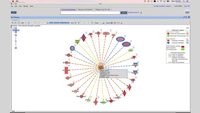QIAGEN IPA
Introduction to Phosphorylation Analyses in QIAGEN Ingenuity Pathway Analysis (IPA)
637 views
In this training, we’ll introduce how you can analyze and interpret your phosphoproteomics data in QIAGEN IPA. Using an example phosphoproteomics dataset, we will answer questions such as:
• How can I format the data before uploading it into QIAGEN IPA?
• How do I set up the analysis?
• Which upstream kinases are implicated in the observed phosphoproteomics changes?
• What are the targets of a particular upstream kinase and how do their levels of phosphorylation change over time?
• How do the levels of phosphorylation change for proteins on Canonical Pathways over time?
• Which biological predictions trend in a time-dependent manner during the time course?
• How do the biological predictions from phosphoproteomics compare with a related transcriptomics dataset?
• How can I format the data before uploading it into QIAGEN IPA?
• How do I set up the analysis?
• Which upstream kinases are implicated in the observed phosphoproteomics changes?
• What are the targets of a particular upstream kinase and how do their levels of phosphorylation change over time?
• How do the levels of phosphorylation change for proteins on Canonical Pathways over time?
• Which biological predictions trend in a time-dependent manner during the time course?
• How do the biological predictions from phosphoproteomics compare with a related transcriptomics dataset?
Related videos
QIAGEN IPA
Analyze, compare and contextualize your biological data with QIAGEN IPA
Discover why QIAGEN Ingenuity Pathway Analysis (IPA) is more than just...
QIAGEN IPA
Interpreting your comparison analyses results in IPA
Learn how to view and interpret your comparison analyses results in IPA and...
QIAGEN IPA
New user training: QIAGEN Ingenuity Pathway Analysis (IPA)
New user training: Large dataset analysis and knowledge base queries using...
QIAGEN IPA
Interpreting the Results of Your Phosphoproteomics Analysis in IPA
Learn how to view and interpret your Phosphoproteomics Analysis results in...



